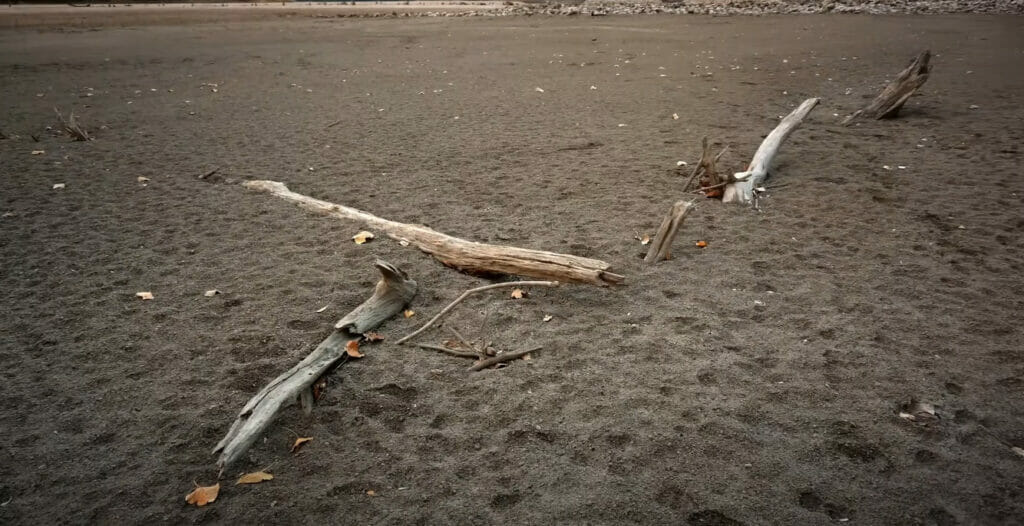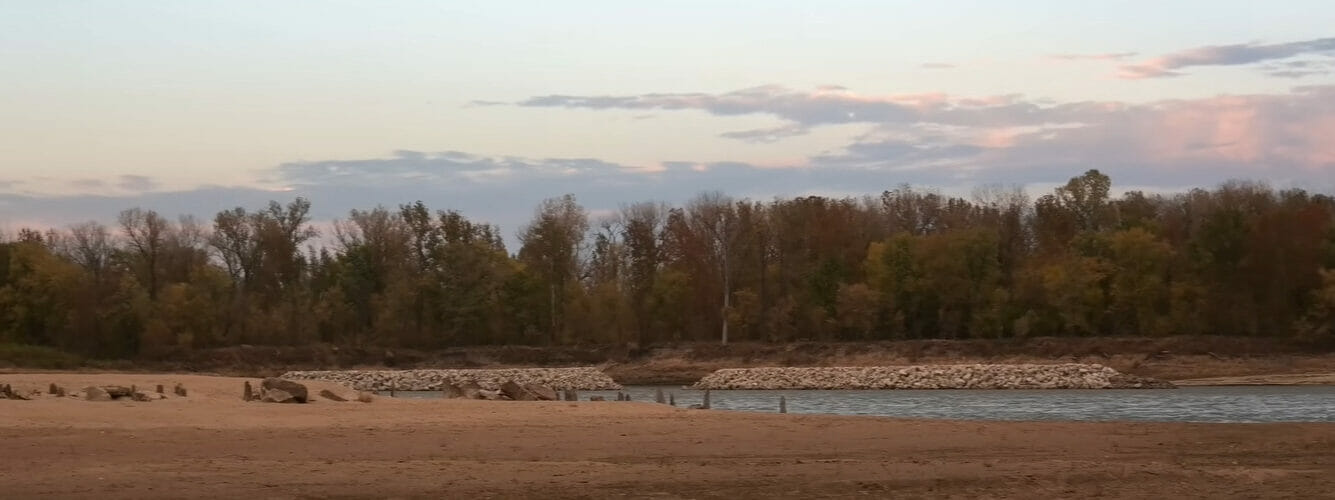Domestic shipping in the United States is facing even more problems and backlogs as the Missouri River is facing heavy drought and receding water levels, causing barges to get stuck in the mud and dry dirt and forcing a backlog of other ships waiting to pass.
Last month the Associated Press wrote, ‘The U.S. Coast Guard says at least eight “groundings” of barges have been reported in the past week, despite low-water restrictions on barge loads.’
Since these problems have only persisted and gotten worse.
Steve Poplar from Poplar Preparedness did a field report on the receding water levels in the River, standing inside the dry channels that would normally be heavily filled.

Poplar explains that many of the barges are being backlogged and in many cases are not fully loading the barges, some even less than 50% of full capacity, due to the shallow waters and congestion. Normally a tugboat will push around 25 barges in the cannel, but now a lot of shipmasters are only towing 15-18 barges at a time.
To put into perspective how much a single barge can hold, Sunny Lagoon gives the conversion rates for just a single barge unit:
One barge has the capacity of 1,500 tons; 62,500 bushels, or 453,500 gallons of products. The typical 15-barge tow is capable of hauling 22,500 tons; 767,500 bushels; or 6,804,000 gallons. Comparing these capacities to other transport modes: One barge has the capacity of 15 jumbo rail hoppers or 58 truck trailers.
So as shipments continue to get stymied, grains like corn and soybeans for example – stockpiles of it up north are starting to go bad as farmers are being forced to hold onto their yields even longer than normal, Poplar explains, coupled with the ever-cooling temperatures and weather conditions as the U.S. transitions into winter.
We’re losing hundreds – if not possibly even millions of tons of grains, soybeans, this year if we can’t get this River up.
[…] This whole area is in a severe drought. […] It means prices for wheats, soybeans, corn, are skyrocketing. We’re going to see that on particularly the exports first, but as it starts coming home how much [of that] has rotted? Poplar explained
Poplar emphasized the need to be sure to have some extra food and dry goods on hand.
These droughts are not just being felt in the U.S., but all over the world nations are being hit with drought and dearth, and other factors as well.
SEE: Europe Faces Worst Drought In 500 Years As Energy Markets Are Headed For ‘Disaster’
AUTHOR COMMENTARY
As I have been talking about for a long while now, the famine in this country and around the world is being ushered in at a blistering pace, coupled with asinine energy problems, by design, and will only get worse. This is why I have alerted to seek out preparations ahead of time.
[5] Now therefore thus saith the LORD of hosts; Consider your ways. [6] Ye have sown much, and bring in little; ye eat, but ye have not enough; ye drink, but ye are not filled with drink; ye clothe you, but there is none warm; and he that earneth wages earneth wages to put it into a bag with holes. [7] Thus saith the LORD of hosts; Consider your ways. [8] Go up to the mountain, and bring wood, and build the house; and I will take pleasure in it, and I will be glorified, saith the LORD. [9] Ye looked for much, and, lo, it came to little; and when ye brought it home, I did blow upon it. Why? saith the LORD of hosts. Because of mine house that is waste, and ye run every man unto his own house. [10] Therefore the heaven over you is stayed from dew, and the earth is stayed from her fruit. [11] And I called for a drought upon the land, and upon the mountains, and upon the corn, and upon the new wine, and upon the oil, and upon that which the ground bringeth forth, and upon men, and upon cattle, and upon all the labour of the hands. Haggai 1:5-11
[7] Who goeth a warfare any time at his own charges? who planteth a vineyard, and eateth not of the fruit thereof? or who feedeth a flock, and eateth not of the milk of the flock? [8] Say I these things as a man? or saith not the law the same also? [9] For it is written in the law of Moses, Thou shalt not muzzle the mouth of the ox that treadeth out the corn. Doth God take care for oxen? [10] Or saith he it altogether for our sakes? For our sakes, no doubt, this is written: that he that ploweth should plow in hope; and that he that thresheth in hope should be partaker of his hope. (1 Corinthians 9:7-10).
The WinePress needs your support! If God has laid it on your heart to want to contribute, please prayerfully consider donating to this ministry. If you cannot gift a monetary donation, then please donate your fervent prayers to keep this ministry going! Thank you and may God bless you.








Famine is coming, America.
Have been hearing about the Mississippi. Didn’t know about the Missouri. I don’t know how much, if any, barge traffic is on the Tennessee River, but it’s down, too. Exposing lots of extensive tree root systems that are usually underwater, seen in recent report. Now I’m wondering about the Ohio. We’ve had a few dry weeks here this fall, but it didn’t seem abnormally so. Creeks are a bit low that flow into the larger rivers & then the Ohio…but those levels always fluctuate more & first, & nothing extreme yet.
–
Didn’t plan on voting, but went out at husband’s urging & report that we had an issue on there about not allowing non-citizen and non-state-resident voting in the State of Ohio. We can occasionally slow things a bit on a local level vote, & that one made sense. Researching candidates beyond that is pretty tough though with all the corruption & lying. Pretty pointless. Which arm of tyranny do you prefer? As if it made a difference.